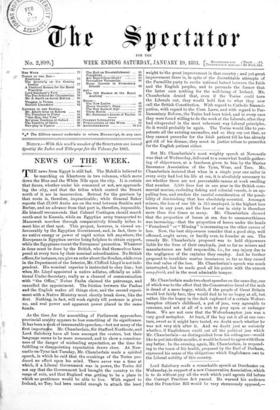As the time for the assembling of Parliament approaches, provincial
orat4ry appears to lose something of its significance. i it has been a eek of innumerable speeches,—but not many of the -first imports_ e. Mr. Chamberlain, Sir Stafford Northcote, and lord Salisbdry have all been amongst the orators, but their language seems to be more measured, and to show a conscious- ness of the danger of misleading expectation, as the time for fulfilling or disappointing expectation draws close. At New. .castle-on-Tyne last Tuesday, Mr. Chamberlain made a spirited speech, in which he said that the croakinga of the Tories pro- duced no effect upon his mind. There never was a time at which, if a Liberal Government was in power, the Tories did not say that the Government had brought the country to the verge of ruin, and that England was getting to be a place in which no gentleman would be able to live. With regard to Ireland, no Tory had been candid enough to attach the least weight to the great improvement in that country ; and yet great improvement there is, in spite of the discreditable attempts of the Parnellite party to excite national hatred between the Irish and the English peoples, and to persuade the former that the latter care nothing for the well-being of Ireland. Mr. Chamberlain denied that, even if the Tories could turn the Liberals out, they would hold fast to what they now call the British Constitution. With regard to Catholic Emanci- pation, with regard to the Corn Laws, and with regard to Par- liamentary Reform, the Tories had been tried, and in every case they were found willing to do the work of the Liberals, after they- had vituperated in the most vehement way Liberal principles. So it would probably be again. The Tories would like to per- petuate all the existing anomalies, and so they cry out that, as they cannot prescribe for the Irish patient till he has already got rid of his disease, they must in justice refuse to prescribe for the English patient either.


































